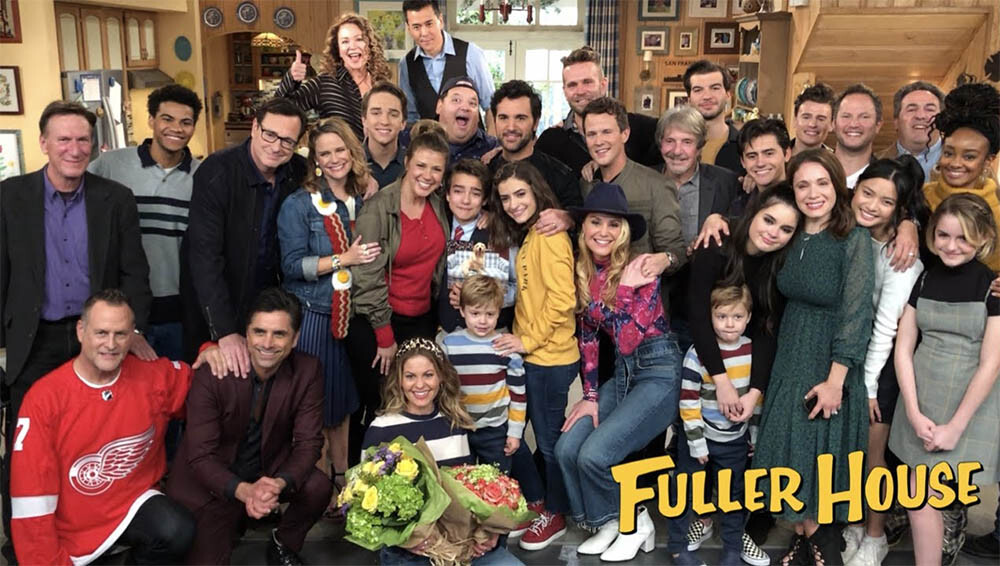So Long Sitcoms And Thank You For All The Laugh Tracks

Welcome to ComedyNerd, Cracked’s daily comedy vertical. Sign up for the ComedyNerd newsletter below.
The sitcom is dead!
Don't Miss
When an esteemed publication like Entertainment Weekly makes that proclamation, one has to sit up and take notice. Call the comedy coroner! The only problem is that EW handed down the same sitcom death sentence in 1999.
Like Nostradamus sitting atop a pile of old TV Guides, TV pundits love nothing more than predicting the death of the situation comedy.
“The conventional thinking among the entertainment press was that the half-hour comedy was dead,” lamented NBC honcho Warren Littlefield. That was in 1983, just months before The Cosby Show took over the world.
Critic Andy Greenwald deemed the state of the sitcom “downright disastrous” in 2014. One year later, Diamondback predicted “the network sitcom will become totally obsolete.” In 2018, Decider asked “are network comedies dead?” All of this gloom, by the way, came during a time when Big Bang Theory was the number one show on television.

HBO Max
Like news of its spiritual forefather Mark Twain, reports of the sitcom’s death have been greatly exaggerated.
But if you keep predicting something often enough, odds are you’ll be correct at some point. What if in 2021 … the doomsayers are actually right?
Pour one out for the network comedy
Sitcoms have proven to be one of television’s more durable forms of entertainment, but their popularity over the past 25 years has been receding faster than Matthew Perry's hairline.
A little historical perspective: During the 1995-96 season, six sitcoms took roost in the Nielsen top 10: Seinfeld, Friends, Caroline in the City, The Single Guy, Home Improvement, and Boston Commons. Six additional comedies landed in the second half of the top 20. That’s a whopping 60% of the country’s most popular shows.

Netflix
But that changed. Just ten years ago, we have to expand our sample from the top 20 to the top 30 shows to find a good handful of sitcoms: Big Bang Theory, Two and a Half Men, Modern Family, Mike and Molly, Two Broke Girls … and Rob. (ROB???) Even as we cheat our sample size to include a few more comedies, sitcoms are down to 20% of the list.

YouTube
Five years ago, the number one show on television was CBS’s monster hit Big Bang Theory. But that’s misleading as a barometer for sitcom popularity -- it was the only comedy among the top 20 shows. Anna Farris’s Mom checked in at #27. Six percent.
Today, you won’t find a single sitcom among the country’s top 20 broadcast shows. Big Bang offshoot Young Sheldon is the biggest comedy hit at #22. Zombie sitcom The Connors lurches in at #26. That’s it.
Clearly, there’s been a shift in viewer appetites for 22 minutes of laughs. But it was surprising, even shocking, that NBC -- the decades-long home of Thursday’s extremely profitable Must-See-TV comedy line-up -- decided not to schedule any sitcoms on their 2021 fall schedule. Not one! Zero! The news was enough for Time to suggest we “pour one out for the network comedy.”
At least CBS is still in the Chuck Lorre business -- isn’t it?
For most of the past decade, traditionalist CBS has been the last sanctuary for the good old-fashioned, filmed-before-a-live-studio-audience, American sitcom. And like multiple incarnations of hoary NCIS, those sitcoms have proven to be extremely profitable (even though the only time you might have actually watched one was in a hospital waiting room).
Never a critical darling, producer Chuck Lorre masterminded CBS’s lukewarm laugh factory, churning out hit after hit like the aforementioned Mike and Molly, Two and Half Men, Mom, and the behemoth Big Bang Theory. For most of the last decade, the ensemble hey-look-at-these-nerds-com was the engine that drove CBS, more often than not making it the nation’s most-watched network.

HBO Max
The show was also an ATM that spit out bazinga dollars. CBS reaped about $125 million to $150 million in ad revenue per season, while the show’s syndication rights delivered more than $1 billion for Warner Bros. Television. With those kinds of profits, who wouldn’t want to be in the Chuck Lorre business?
So even with all that success, CBS is now taking a middle position on sitcoms -- eliminating them on most nights but doubling down on Chuck Lorre comedy. On the schedule: Young Sheldon (doing its best to carry on the Big Bang vibe), United States of Al (despite accusations of racism and clumsy casting), Bob Hearts Abishola (somehow entering Season 3), and B Positive (exploring the hilarious world of kidney transplants). The only non-Lorre entries are the Cedric the Entertainer vehicle The Neighborhood and haunted house comedy Ghosts.

YouTube
With only six sitcoms in its line-up, CBS is making the strongest commitment to comedy of any traditional network.
ABC is airing only four sitcoms, leaning into nostalgia with The Goldbergs (basically That 70s Show in the 1980s), Home Economics (with 70s Show lead Topher Grace), a Wonder Years reboot (with a black cast this time around), and the wheezing, reanimated, Roseanne-less The Connors.
And …. that’s all, folks. NBC and Fox are out of the sitcom game altogether this fall, at least until the mid-season replacements arrive. Fox still has its Animation Domination block, but there’s not a human comedy star to be found.
Getting out of the laughs game
So, why are networks bailing? Well, sitcom ratings, like the ratings for all broadcast offerings, have been sliding for years, but that only partly explains why the networks are abandoning comedy. The economics of TV laughs are becoming increasingly complicated.
Deadline reported last year that Sony TV, producer of ABC’s The Goldbergs, has told networks that it won’t be creating any new sitcoms under the current economic model. Lionsgate TV said “same” -- It no longer make sense for them to be in the once-lucrative sitcom business. Why?

Hulu
It’s just one more way streaming has changed the game.
Here’s how it used to work: Production Company X put up the cash for Funny New Show (starring Andy Richter). It expected to lose money on Funny New Show -- network fees rarely covered full production costs in early seasons -- but the risk was worth the reward IF the show could get to four seasons and 100 episodes.
Once it crossed that threshold, syndication cash quickly filled Production Company X’s coffers and now that Funny New Show was a certified hit, the network would take on all the production costs starting with Season 5. Funny New Show was now so profitable that Production Company X could bankroll the next round of prospective Andy Richter comedy hits.
Not any more.
Production companies used to sell networks a license fee that only covered broadcast rights. But with ratings down the toilet, networks now demand streaming rights as well. If the network can no longer count on bountiful broadcast ad dollars, it wants its own streaming platforms to make up the difference.
Except Funny New Show’s streaming rights, which Production Company X used to sell to Netflix, were one of a production company’s only paths to profit. If Funny New Show has already been streaming on cbs.com, those rights become less valuable when they finally become available.
Factor in local stations and cable networks not buying reruns the way they used to, as well as an international marketplace that doesn’t get American comedies. Who’s left to buy Funny New Comedy once the network is done with it? Hardly anyone, which makes producing a network sitcom an increasingly dumb idea.
And if no one can afford to produce sitcoms, will the doomsayers will finally be proven right once and for all?
A supercharged CBS for the digital age
It’s long been assumed that Netflix aspires to be the next HBO or high-end movie studio, investing big bucks on highbrow projects that bring prestige when awards season rolls around.
But hang on. According to former Hollywood Reporter editor and Puck News cofounder Matthew Belloni, the streamer’s goal is something else entirely. “Netflix actually wants to become a supercharged CBS for the digital age before the broadcast networks can figure out how to become Netflix.”
Status is nice, but what Netflix really needs to justify its bloated market price is appeal to as broad of an audience as possible. That means ruthlessly efficient cost-to-viewer ratios. That means Fuller House, the One Day at a Time reboot, the recently announced update of Who’s the Boss. TV comfort food, available on demand.

YouTube
For Production Company X, the economics start to make sense again. In exchange for global rights, Netflix pays production companies “cost plus,” meaning show costs plus a small profit are built in from the get-go. Production Company X gives up the possibility of generational wealth that comes with the next Friends but eliminates the risk associated with the grand majority of sitcoms that never see Year 5. Because stratified audiences make a new Friends nearly impossible, it’s easy to shake hands on this kind of deal.
The sitcom will live. It just may be changing its address from the old CBS to the new one. And it won’t only be kitschy reboots -- from Unbreakable Kimmy Schmidt to Master of None to American Vandal, Netflix has shown it will roll the dice on original, compelling comedy content. To compete for subscribers, HBO Max, Disney +, Hulu, and others will do the same.
But was Time correct when it suggested pouring out a cold one for the network version of the sitcom? History tells us the forecasters will likely be wrong yet again.
"I've been doing this long enough to know I've heard the bold statement that 'This is it. won't happen again' many times," Chuck Lorre told CNN. "And it does. So humility would suggest that making a blanket statement, that this is the end, is probably foolish."
The sitcom is dead. Long live the sitcom!
